- Home
- Stephanie Laurens
The Seduction of Sebastian Trantor
The Seduction of Sebastian Trantor Read online
THE SEDUCTION OF SEBASTIAN TRANTOR
Stephanie Laurens
Contents
Prologue
Chapter One
Chapter Two
Chapter Three
Chapter Four
Chapter Five
Chapter Six
Chapter Seven
Announcement Page
An Excerpt from The Capture of the Earl of Glencrae
About the Author
Also by Stephanie Laurens
Copyright
About the Publisher
Prologue
Sebastian Montgomery Trantor sank back in the wing chair angled before his library’s hearth, and smiled rather smugly at the blaze roaring in the grate. There was something intensely satisfying in sitting snug in his own home while beyond his walls a tempest raged.
Outside, the wind moaned, rising to a bansheelike crescendo before dying away to a dismal drone. Rain swept in sheets across the lead-paned windows, punctuated by the staccato patter of hail. It was a very good night to be safe inside.
Brandy glinted in the cut-crystal tumbler on the table by his elbow. The weight of the leather-bound tome he was perusing felt comfortable where it rested across his thighs.
Gaze fixed on the leaping flames, he reached for the tumbler, sipped. Savored the complex flavors as the brandy slid down his throat, felt the warmth of the fire on his booted feet.
All were comforts he’d worked for, had envisaged, planned, and striven to achieve, and now he had them: the gothic monstrosity of Grimoldby Abbey that he’d purchased when it had been one step away from irredeemable ruin had been transformed into a modern home sporting every comfort. His investments had prospered further, enabling him to indulge his interest in ancient languages, scripts, and cryptography. His library would make any expert swoon.
He’d found and employed staff who, like him, appreciated a quiet, restful life, one undisturbed by unnecessary fuss.
These elements—a large, old, but comfortable home and the staff to go with it, money enough to do as he wished, an excellent library and the few other material comforts he enjoyed—had been the stuff of his dreams through the years of his army service. As a second son, he’d done his duty and, as was his nature, had enjoyed the endeavor while it lasted, especially as his knack for ciphers had ensured he was in frequent demand for special assignments, in turn ensuring he’d never been bored.
But the wars had been over for several years. On returning to England, he’d set about assembling his dreamed-of future life. And now it was his.
His to wallow in and enjoy.
Smiling again, he set down the tumbler, picked up his book, and focused on the page of Mesopotamian hieroglyphics he was slowly working his way through.
He’d barely completed a line when someone started hammering on the front door. Not just a knock, but a ceaseless battering.
He frowned, listened to his butler’s footsteps as Finley crossed the tiles of the hall to the massive oak front doors. Faint sounds of an arrival reached him; the library door muffled the voices, yet apparently Finley had admitted whoever had sought aid. From the desperation of the hammering, aid had been the goal.
Imagining an overturned carriage or some similar mishap and having every confidence that Finley would deal with the matter quietly and expeditiously, Sebastian refocused on his page.
The library door flew open.
He raised his head but, recognizing the intruder’s boot steps, didn’t rise.
His brother Thomas strode directly to the fireplace, bringing a lingering scent of ozone and rain.
Without looking his way, Thomas bent and held his hands to the blaze.
Sebastian glanced back to see Finley standing in the open doorway, a question on his face. “Bring another glass.” Sebastian looked at Thomas. “And prepare a room for his lordship.”
Finley bowed and withdrew. Sebastian heard the door click shut.
Before he could ask what had brought his brother out on such a night, Thomas whirled.
Sebastian was shocked by the haggardness in his face. “What is it?”
Thomas stared at him, after a moment opened his mouth, then glanced at the door. “Wait. I don’t want to be interrupted.”
Sebastian obligingly possessed his soul in patience while Thomas fell to pacing agitatedly before the hearth.
Eventually Finley returned bearing a tray with another tumbler and the decanter of port Thomas favored.
Finley set down the tray, then glanced at Thomas. At his curt nod, Finley poured a generous dose of the port, restoppered the decanter, and handed the glass to Thomas.
“Thank you, Finley,” Sebastian said. “That will be all.”
Finley bowed and retreated.
Thomas swigged a sizeable gulp of the port.
Inwardly wincing—he’d rarely seen his brother so distraught—Sebastian murmured, “I’m surprised to see you. Isn’t Estelle’s time near?”
His sister-in-law was expecting her fifth child, one everyone held high expectations would be Thomas’s long-hoped-for heir.
“The time is nigh—well, now.” Thomas took another gulp, then lowered the glass. “She’s had the baby.”
Thomas’s grim tone declared the news wasn’t good, but he then fell into a brown study, staring at the half full glass in his hand.
“And?” Sebastian prompted.
“It’s another girl!”
“Ah.”
“Five girls! Five!” Thomas raised his head, set his jaw. “I’ve come to tell you—no more. Estelle says no more, and I agree with her. Aside from all else, having girl after girl does nothing to protect the estate—quite the opposite. Do you have any idea of the costs involved in dowering, then puffing off, five chits?”
Sebastian had no idea and didn’t want to know, had lived in the fond hope that he would never have to know.
Thomas drained his glass, set it on the mantelpiece and fell to pacing again. “Estelle and I . . . the whole purpose was to have an heir to whom the estate can safely be passed, but after five daughters it’s clear she and I are not going to bring about that so-desirable end.”
“I . . . see.” Sebastian had a dreadful premonition as to where this was leading.
“Precisely. And as it can’t be me, it’ll have to be you.” Thomas halted and fixed his gaze on Sebastian. “For the sake of the estate and, heaven help us, the Trantor name, you’ll have to bite the bullet, marry some chit, and get the family the heir it needs.”
“Hmm.” Sebastian flirted with the hope that he’d fallen asleep over his hieroglyphics and he’d wake up and discover this was all a nightmare. But no—Thomas kept talking, his gaze boring into him.
“You’re the only one who can do it. You know what’ll happen if you don’t—after you, Mad Freddie will inherit the lot and promptly lose it at cards or on some flea-bitten nag. The notion doesn’t bear thinking about. Even if you and I won’t be around to see it, it still doesn’t bear thinking about.”
That was hard to argue. Mad Freddie was the family nickname for their cousin Frederick, only offspring of their father’s younger brother. Suffice it to say that not even his doting mother, Pamela, turned a hair at hearing her darling so described. There was no denying Freddie’s propensity for foolish wagers and idiotic starts. Even his late father had recognized the problem and left his own estate in trust until Freddie reached the age of forty. However, as the primary estate of the Trantors was tied to the title of Viscount Coningsby that Thomas currently held, as matters stood, on Thomas’s death the estate would pass first to Sebastian, nine years Thomas’s junior. If Sebastian had no heirs—the point that had, with the birth of his lates
t niece, become critical—then on Sebastian’s death the estate would pass to Freddie. As Freddie was a good thirteen years younger than Sebastian, there was an excellent chance that, barring Sebastian’s marrying and begetting an heir, the estate would, in the fullness of time, fall into Freddie’s hands.
Thomas raked a hand through his auburn hair. “Frankly, the family will be on your doorstep as soon as they hear, badgering you to marry without delay. Once they learn of our latest effort, they’ll panic—at least all those who draw from the estate will, and with good reason.”
Sebastian raised his brows. “Why? That’s always puzzled me. It’s not as if they stand to lose anything—the estate will continue to thrive in either your hands or mine, and they’re all much older than us. Even your girls—all five of them—are likely to be married and safely supported by their husbands before you turn up your toes.”
“True, but if you imagine that’s going to keep our aunts and cousins from panicking at the prospect of Freddie ever inheriting, you’ll need to think again.” Thomas paused, then added, “I think it’s the uncertainty—the prospect, however remote, that something unexpected could happen to both of us, and then they would indeed be faced with dealing with Freddie.”
Sebastian grimaced. “They can’t deal with Freddie—no one can.”
“To be perfectly honest, I’m less concerned with our aunts and cousins than with all the others who, should the unexpected occur and both you and I die, will be left without a hope. Not just my girls, but all the people on the estate. Hell’s bells, we—you and I—have known them all our lives. What odds that, should Freddie inherit, within a year the estate will be bankrupt and they’ll be dismissed and turned out of their homes?”
Sebastian sighed. “I doubt you could find any bookmaker willing to take that bet.”
“Exactly.” Thomas dropped into the armchair on the opposite side of the hearth, his gaze on Sebastian’s face. After a moment, he said, “I never thought I’d have to ask this of you—I know you’ve never seen yourself as the marrying kind—but for the sake of the family, the name, and the estate, can you see your way to taking a wife?”
Sebastian could almost hear the bugle, could feel the tug of loyalty, of familial devotion. He was accustomed to answering duty’s call no matter how irksome . . . and really, how hard could it be? “Yes. All right. I will.”
Thomas blinked. “You will? I mean, I hoped you would agree, but I wasn’t sure . . .”
Sebastian picked up his glass, sipped, and started to plan. “It’s February. The Season will start soon. I’ll go up to London, look over the candidates and find one who’ll suit.” He glanced at the amber liquid in his glass. “And then I suppose I’ll do what I can to get us our heir.”
He glanced at Thomas, saw his brother sink back into the chair, saw some of the haggardness leave his features.
“Thank God.” Thomas met his eyes, almost managed a smile. “There’s hope for the Trantors yet.”
Chapter One
Three months later, Sebastian sorely regretted his altruism. It wasn’t the begetting of an heir that had him stumped, it was the detail that preceded that—the securing of a suitable wife. Although he’d scouted far and wide through the ballrooms, drawing rooms, and salons of the capital, thus far he’d found not a single likely candidate, not a single young lady whose company he could stomach for longer than five minutes.
For some, his tolerance could be measured in seconds.
Which was why, after taking one turn about Lady Rothbury’s ballroom and confirming the absence of any chit he hadn’t already struck off his list, he slipped away.
Walking quickly and silently down the corridors, he penetrated deeper into the unlit portion of the Rothbury mansion. He’d been there once before; if he recalled correctly, his lordship’s library was at the opposite end of the house from the ballroom, which would make it the perfect bolt-hole. He would have left the house altogether, but his aunt, Lady Fothergill, had said she would attend; she’d expect to see him doing his familial duty and dancing with young ladies, but as she’d yet to arrive he saw no reason to prolong his exposure to the garrulous hordes.
Not only were most of the young ladies on the marriage mart certifiable twits—or if not that, then painfully shy—far too many of them giggled.
Some even simpered.
A sense of relief filled him—much as when he’d sighted English pickets after a quick trip behind enemy lines—when he reached the end of a dark corridor and the library door. Grasping the knob, he turned it, blessing Lord Rothbury when the door opened.
Not that a locked door would have kept him out.
There was no lamp left burning, but faint moonlight flooded through the uncurtained windows; a quick survey confirmed the room was empty. He stepped in, closed the door, then paused and looked at the lock. There was no key in it, but . . . it was the work of a minute to trip the lock with the small tool he still carried in his pocket. Old habits died hard.
Heaving a sigh of relief, feeling tension—and the sense of being constantly hunted—drain away, he glanced around the L-shaped room. A large mahogany desk stood facing the door, an admiral’s chair behind it, with piles of correspondence neatly stacked on either side of a leather-framed blotter. A lamp stood on one corner of the desk, but lighting it would result in a weak glow showing beneath the library door. Turning to survey the shorter arm of the room, Sebastian saw a wing chair tucked in the corner, facing the distant window, yet remaining wreathed in shadow. A lamp stood on a small table alongside.
Crossing to the table, he lit the lamp. By its glow he scanned the nearby shelves. The last time he’d been there, he’d been searching for a particular volume of ancient texts; his lordship shared his interest in such things.
“Ah—this will do.” Drawing out a hefty tome, he opened it, then sat in the armchair, settled comfortably, and gave himself over to Herodotus in the original Greek. Not Mesopotamian, but as a distraction, it would do.
Uncounted minutes later, the doorknob rattled, jerking him back from far away. Smugly smiling at his forethought in locking the door, he waited to hear footsteps retreat.
After a moment of silence, the sound of metal sliding and probing inside the lock reached his ears.
Inwardly swearing, he reached out and doused the lamp. Whoever was breaking into his lordship’s library could pick locks, too.
It took them longer than it would have taken him, but eventually the bolt clicked back. A moment later, the knob turned and the door was cautiously opened.
His eyes were still adjusting to the moonlight. The large and heavy book held closed on his lap, he sank back in the armchair. Its wings would conceal him while he waited to see who entered the room. He couldn’t see the door, but if they went to the desk, he’d be able to peer around the chair’s side and see them. Unless the intruder looked specifically into the heavily shadowed corner, they were unlikely to notice him.
Tabitha Makepeace glanced quickly around the library, then whisked inside and shut the door. Pausing with her hand on the knob, she debated, but then reluctantly released it; locking the door would make her feel safer, but she might need to beat a hasty retreat.
Faint moonlight washed through the uncurtained windows, lighting her way as she crossed quickly to the desk. “With any luck, no one will come this way, but I’ll need to return as soon as I can.”
Muttering to herself was a bad habit, but as long as she was alone, why not? Especially when she had to focus on a task, the commentary was helpful.
She searched, found tinder, and lit the desk lamp. She adjusted the wick and shade so a pool of light fell on the desktop, then dumped her reticule on the desk’s corner, drew up the admiral’s chair, sat, and considered the front of Lord Rothbury’s desk. “Where, exactly, would he keep such information? In a notebook kept specifically for the task would be my guess—my hope. A journal, perhaps, but as the intention would be to conceal the information forever, a notebook’s more likely. So w
here? Here?” Eyes on the desk, she nodded. “Yes. I’m sure it would be here.” She glanced at the door. “If he keeps the door locked, perhaps he might feel safe enough to just leave it in a drawer.”
Leaning forward, she drew out the first drawer on the left.
Ten minutes later, after much muttering and rummaging, then putting everything back exactly as she’d found it, she sat back. Frowned. “I knew he was fastidious and pedantic—that’s why he’s certain to have written the information down and kept it all in one place, in one book. But who could have imagined he’d be so compulsively neat? There’s not even one chewed pencil or half-used stub of sealing wax, let alone an errant piece of string.” She gave a contemptuous snort. “So it’ll be here, neat, safe and secure. Most likely in a hidden drawer or compartment.”
She glanced around the library again; she’d been working in the light, so the shadows beyond the desk appeared denser. She returned her gaze to the desk. “I’d still wager it’ll be somewhere in here rather than on the shelves.”
Bending once more to her task—literally—she checked under the kneehole, then systematically checked each drawer for length, depth, and width. “There has to be some anomaly somewhere.”
Five minutes later, with a huff of frustration, she sat back and regarded the disobliging piece of furniture. She narrowed her eyes. “I know you’re hiding it, but where?”
Abruptly, she sat up. “Your desktop is remarkably thick—thick enough for a hidden compartment.” She pulled out the top left drawer, put her hand in the gap and felt upward, but even reaching to the back of the space and feeling carefully with her fingertips, she detected no line or telltale gap. There was no give in the wood forming the upper surface of the space.
“All right. Not there.” Replacing the drawer, she searched above the drawer to the right, with the same result. “The center drawer, then—” She broke off, sensing triumph. “Of course! That’s it.” Hurrying, she replaced the right upper drawer, drew out the center drawer and set it on the blotter. “Even though there’s a lock on the center drawer, he doesn’t lock it, but just keeps his pens, ink, pencils, and so on in there, so no one would suspect that that’s where he hides his secret documents.”

 Lady Osbaldestone’s Plum Puddings: Lady Osbaldestone’s Christmas Chronicles Volume 3
Lady Osbaldestone’s Plum Puddings: Lady Osbaldestone’s Christmas Chronicles Volume 3 The Beguilement of Lady Eustacia Cavanagh: The Cavanaughs Volume 3
The Beguilement of Lady Eustacia Cavanagh: The Cavanaughs Volume 3 Loving Rose: The Redemption of Malcolm Sinclair (Casebook of Barnaby Adair)
Loving Rose: The Redemption of Malcolm Sinclair (Casebook of Barnaby Adair) By Winter's Light
By Winter's Light Devil's Bride
Devil's Bride The Tempting of Thomas Carrick
The Tempting of Thomas Carrick![Cynster [22.00] A Match for Marcus Cynster Read online](http://i1.bookreadfree.com/i/03/16/cynster_[22_00]_a_match_for_marcus_cynster_preview.jpg) Cynster [22.00] A Match for Marcus Cynster
Cynster [22.00] A Match for Marcus Cynster All About Love c-6
All About Love c-6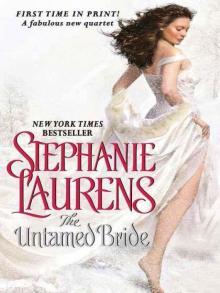 Cobra 01 The Untamed Bride
Cobra 01 The Untamed Bride A Lady of Expectations and Other Stories
A Lady of Expectations and Other Stories By Winter's Light_A Cynster Novel
By Winter's Light_A Cynster Novel And Then She Fell
And Then She Fell The Greatest Challenge of Them All
The Greatest Challenge of Them All The Edge of Desire
The Edge of Desire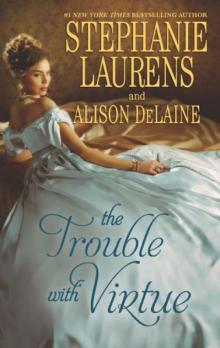 The Trouble With Virtue: A Comfortable WifeA Lady by Day
The Trouble With Virtue: A Comfortable WifeA Lady by Day Fair Juno
Fair Juno THE LEGEND OF NIMWAY HALL: 1750 - JACQUELINE
THE LEGEND OF NIMWAY HALL: 1750 - JACQUELINE Four In Hand
Four In Hand The Reckless Bride
The Reckless Bride Stephanie Laurens Rogues' Reform Bundle
Stephanie Laurens Rogues' Reform Bundle The Untamed Bride Plus Black Cobra 02-03 and Special Excerpt
The Untamed Bride Plus Black Cobra 02-03 and Special Excerpt The Lady's Command (Adventurers Quartet #1)
The Lady's Command (Adventurers Quartet #1) The Seduction of Sebastian Trantor
The Seduction of Sebastian Trantor The Daredevil Snared (The Adventurers Quartet Book 3)
The Daredevil Snared (The Adventurers Quartet Book 3)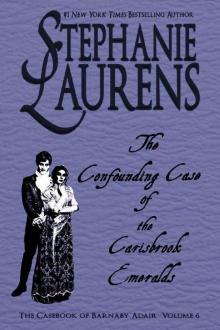 The Confounding Case Of The Carisbrook Emeralds (The Casebook of Barnaby Adair 6)
The Confounding Case Of The Carisbrook Emeralds (The Casebook of Barnaby Adair 6) Lord of the Privateers (The Adventurers Quartet)
Lord of the Privateers (The Adventurers Quartet)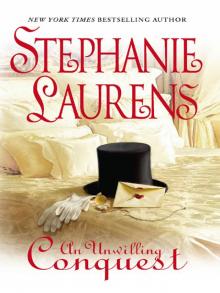 An Unwilling Conquest
An Unwilling Conquest Brazen Bride
Brazen Bride On a Wild Night
On a Wild Night The Masterful Mr. Montague: A Casebook of Barnaby Adair Novel
The Masterful Mr. Montague: A Casebook of Barnaby Adair Novel Lord of the Privateers
Lord of the Privateers Royal Bridesmaids
Royal Bridesmaids Beyond Seduction
Beyond Seduction It Happened One Night
It Happened One Night The Ideal Bride
The Ideal Bride The Promise in a Kiss
The Promise in a Kiss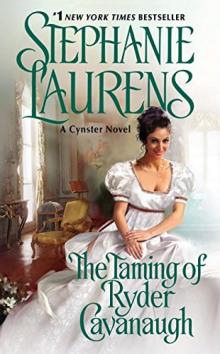 The Taming of Ryder Cavanaugh
The Taming of Ryder Cavanaugh The Ideal Bride c-12
The Ideal Bride c-12 All About Love
All About Love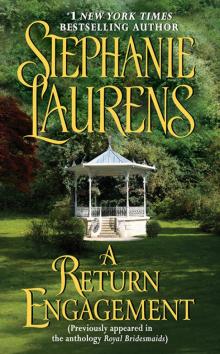 A Return Engagement
A Return Engagement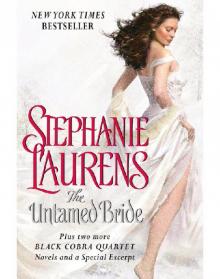 The Untamed Bride Plus Two Full Novels and Bonus Material
The Untamed Bride Plus Two Full Novels and Bonus Material Viscount Breckenridge to the Rescue
Viscount Breckenridge to the Rescue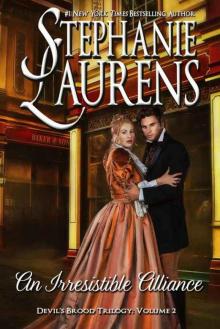 An Irresistible Alliance (Cynsters Next Generation Novels Book 5)
An Irresistible Alliance (Cynsters Next Generation Novels Book 5) The Daredevil Snared
The Daredevil Snared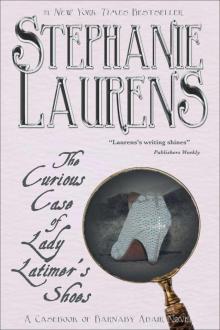 The Curious Case of Lady Latimer's Shoes: A Casebook of Barnaby Adair Novel
The Curious Case of Lady Latimer's Shoes: A Casebook of Barnaby Adair Novel A Lady of Expectations and Other Stories: A Lady of ExpectationsThe Secrets of a CourtesanHow to Woo a Spinster
A Lady of Expectations and Other Stories: A Lady of ExpectationsThe Secrets of a CourtesanHow to Woo a Spinster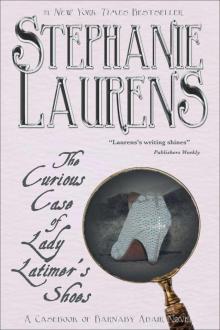 The Curious Case of Lady Latimer's Shoes: A Casebook of Barnaby Adair Novel (The Casebook of Barnaby Adair)
The Curious Case of Lady Latimer's Shoes: A Casebook of Barnaby Adair Novel (The Casebook of Barnaby Adair) The Truth About Love
The Truth About Love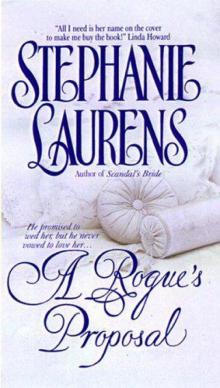 A Rogue's Proposal
A Rogue's Proposal The Elusive Bride
The Elusive Bride The Perfect Lover
The Perfect Lover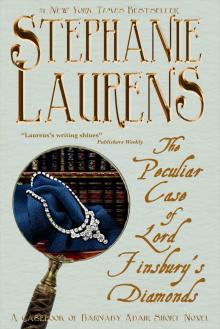 The Peculiar Case of Lord Finsbury's Diamonds: A Casebook of Barnaby Adair Short Novel
The Peculiar Case of Lord Finsbury's Diamonds: A Casebook of Barnaby Adair Short Novel The Lady Risks All
The Lady Risks All The Murder at Mandeville Hall: The Casebook of Barnaby Adair: Volume 7
The Murder at Mandeville Hall: The Casebook of Barnaby Adair: Volume 7 All About Passion
All About Passion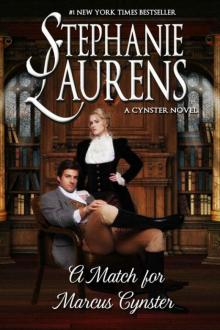 A Match for Marcus Cynster
A Match for Marcus Cynster By Winter's Light: A Cynster Novel (Cynster Special Book 2)
By Winter's Light: A Cynster Novel (Cynster Special Book 2) The Lady By His Side
The Lady By His Side The Pursuits of Lord Kit Cavanaugh
The Pursuits of Lord Kit Cavanaugh Tangled Reins
Tangled Reins To Distraction
To Distraction A Rake's Vow
A Rake's Vow A Comfortable Wife
A Comfortable Wife A Lady of His Own bc-3
A Lady of His Own bc-3 The Capture of the Earl of Glencrae
The Capture of the Earl of Glencrae Scandals Bride c-3
Scandals Bride c-3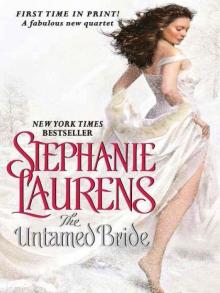 Untamed Bride
Untamed Bride The Brazen Bride
The Brazen Bride The Lady By His Side (Cynsters Next Generation Novels Book 4)
The Lady By His Side (Cynsters Next Generation Novels Book 4) Tangled Reins and Other Stories
Tangled Reins and Other Stories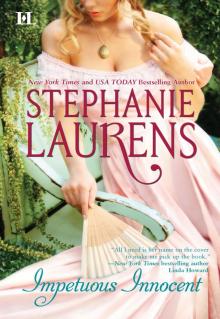 Impetuous Innocent
Impetuous Innocent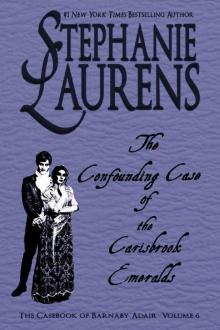 The Confounding Case Of The Carisbrook Emeralds
The Confounding Case Of The Carisbrook Emeralds Stephanie Laurens - B 6 Beyond Seduction
Stephanie Laurens - B 6 Beyond Seduction What Price Love?
What Price Love? A Fine Passion
A Fine Passion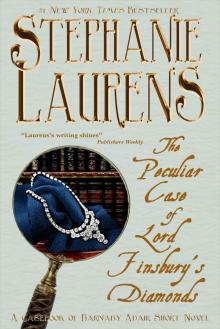 The Peculiar Case of Lord Finsbury's Diamonds: A Casebook of Barnaby Adair Short Novel (The Casebook of Barnaby Adair)
The Peculiar Case of Lord Finsbury's Diamonds: A Casebook of Barnaby Adair Short Novel (The Casebook of Barnaby Adair) Where the Heart Leads
Where the Heart Leads The Designs of Lord Randolph Cavanaugh
The Designs of Lord Randolph Cavanaugh A Secret Love c-5
A Secret Love c-5 On a Wicked Dawn c-10
On a Wicked Dawn c-10 A Gentleman's Honor
A Gentleman's Honor THE LEGEND OF NIMWAY HALL_1750_JACQUELINE
THE LEGEND OF NIMWAY HALL_1750_JACQUELINE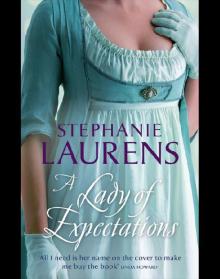 A Lady of Expectations
A Lady of Expectations Royal Weddings: An Original Anthology
Royal Weddings: An Original Anthology The Ideal Bride (Cynster Novels)
The Ideal Bride (Cynster Novels) Mastered by Love
Mastered by Love A Buccaneer at Heart
A Buccaneer at Heart Captain Jack’s Woman / A Gentleman's Honor
Captain Jack’s Woman / A Gentleman's Honor Devil's Bride with Bonus Material
Devil's Bride with Bonus Material A Lady of His Own
A Lady of His Own A Secret Love
A Secret Love Melting Ice
Melting Ice Scandal's Bride
Scandal's Bride Lady Osbaldestone’s Christmas Goose
Lady Osbaldestone’s Christmas Goose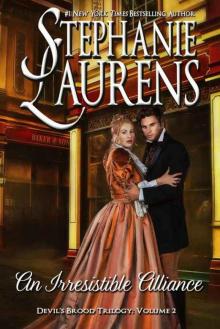 An Irresistible Alliance
An Irresistible Alliance It Happened One Season
It Happened One Season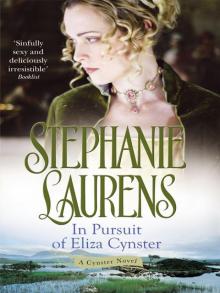 In Pursuit Of Eliza Cynster
In Pursuit Of Eliza Cynster Captain Jack's Woman
Captain Jack's Woman The promise in a kiss c-8
The promise in a kiss c-8 The Masterful Mr. Montague
The Masterful Mr. Montague The Lady Chosen
The Lady Chosen A Gentleman's Honor bc-2
A Gentleman's Honor bc-2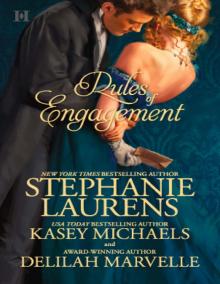 Rules of Engagement: The Reasons for MarriageThe Wedding PartyUnlaced (Lester Family)
Rules of Engagement: The Reasons for MarriageThe Wedding PartyUnlaced (Lester Family) Secrets of a Perfect Night
Secrets of a Perfect Night The Taste of Innocence
The Taste of Innocence On A Wicked Dawn
On A Wicked Dawn The Untamed Bride
The Untamed Bride A Rogues Proposal c-4
A Rogues Proposal c-4 Rakes Vow c-2
Rakes Vow c-2 Devils Bride c-1
Devils Bride c-1 Hero, Come Back
Hero, Come Back On a Wild Night c-8
On a Wild Night c-8 All About Passion c-7
All About Passion c-7